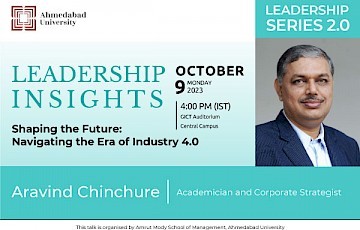Dr C Rangarajan Discusses the Forks in the Road of his RBI Journey and Beyond With D Subbarao

Best known for his 1991 economic reforms, which were kickstarted by his unprecedented decision to devalue the rupee when India faced its biggest balance of payments crisis, former RBI Governor (1992-97) and Ahmedabad University's Distinguished University Professor C Rangarajan discussed his book Forks in the Road: My Days at RBI and Beyond with D Subbarao, ex-RBI Governor (2008-2013). Interestingly Mr Subbarao has also written a book about his days as the Governor of RBI titled, Who Moved My Interest Rate?: Leading the Reserve Bank of India Through Five Turbulent Years. The evening was replete with revelations and insights by the two distinguished guests into some of the most revolutionary decisions that changed India's status in the world.
Mr Subbarao pointed out that the rupee was devalued in two steps, on July 1 and July 3, 1991, and asked Dr Rangarajan whether leading a decision of such magnitude might have been fraught with apprehension or certainty. Dr Rangarajan shared that with the devaluation, the idea was to instil confidence in the economy of India. He said, "We wanted to send out a signal that we were serious about handling the balance of payments crisis. We were sure on that front. But it was among the first huge decisions that the newly formed PV Narsimha Rao government had to take on assuming power. We knew the decision would have a political fallout. PV Narsimha Rao, apparently, had asked then Finance Minister Manmohan Singh to stop the second round of devaluation, but I was unaware of this. I was unreachable then, and Manmohan Singh managed to reach me only at 9.30 am on July 3, 1991. He asked me, 'What's your status?' I said, 'I've jumped.' In hindsight, if we had stopped the second step of devaluation, it would have sent the wrong signal to the world." Hop, Skip, Jump was the code word for the devaluation process.
Mr Subbarao spoke about Dr Rangarajan's bold decision to bring respect and autonomy to the central bank of India through a complete reform of the monetary policy. Dr Rangarajan said, "I had been propagating the idea of RBI's autonomy for a long time. In fact, before me, former RBI Governor HVR Iyengar had written to then Finance Minister TT Krishnamachari about this automatic financing of government deficit by the RBI and how wrong this practice was, but it wasn't paid heed to. When I brought this up with Dr Manmohan SIngh, he agreed. It took us three years, but we changed the practice. The central bank must have operational independence."
Both the former governors discussed economic management in India pre- and post-1991. Mr Subbarao apprised students, who had no reference point for the country in the pre-1991 era except for reading material, about how getting a simple device such as a landline used to take months, or how even bread manufacturing was managed by the Indian government. Mr Subbarao said, "In the light of all that we had witnessed, the reforms of 1991 were phenomenal. Besides the balance of payments crises, in terms of economic management, it opened the floodgates in the best way possible."
Dr Rangarajan identified three significant breaks that distinguished the post-1991 era from that before. "It was a system full of permits, controls, and limits. What to produce, when to produce, and even how to produce it was managed by the government. And it was considered the ideal way to be. Our five-year plans were premised on this. While I am not saying we hadn't accomplished anything between 1947-87, the reforms did change the way things were managed. The first was to do away with permits and restrictions to the entry and expansion of industries. The second was to redefine the role of the state and reverse the strong bias of state ownership. The final break, and one that I consider much bolder than even devaluing the rupee, was opening up of foreign trade."



